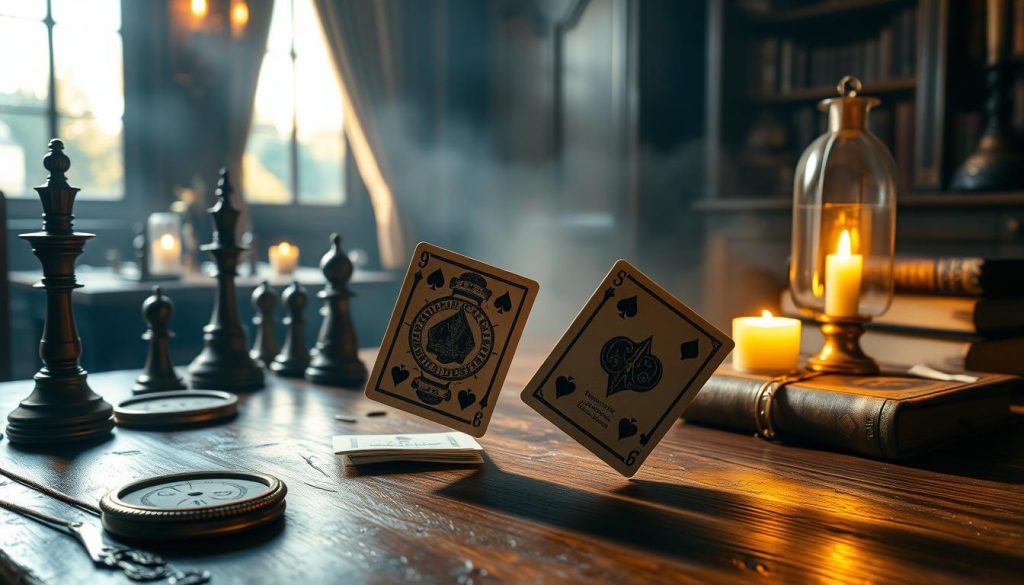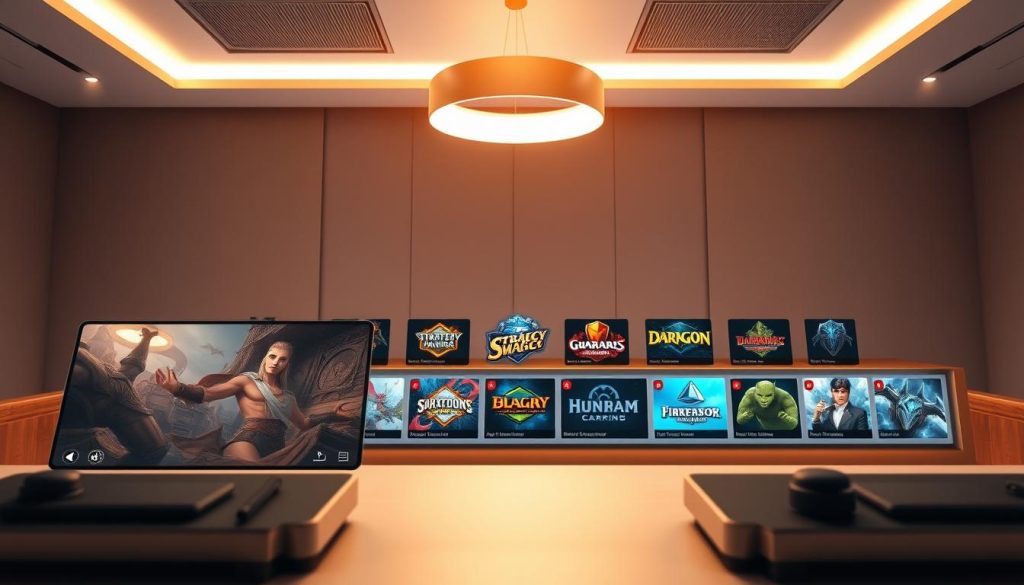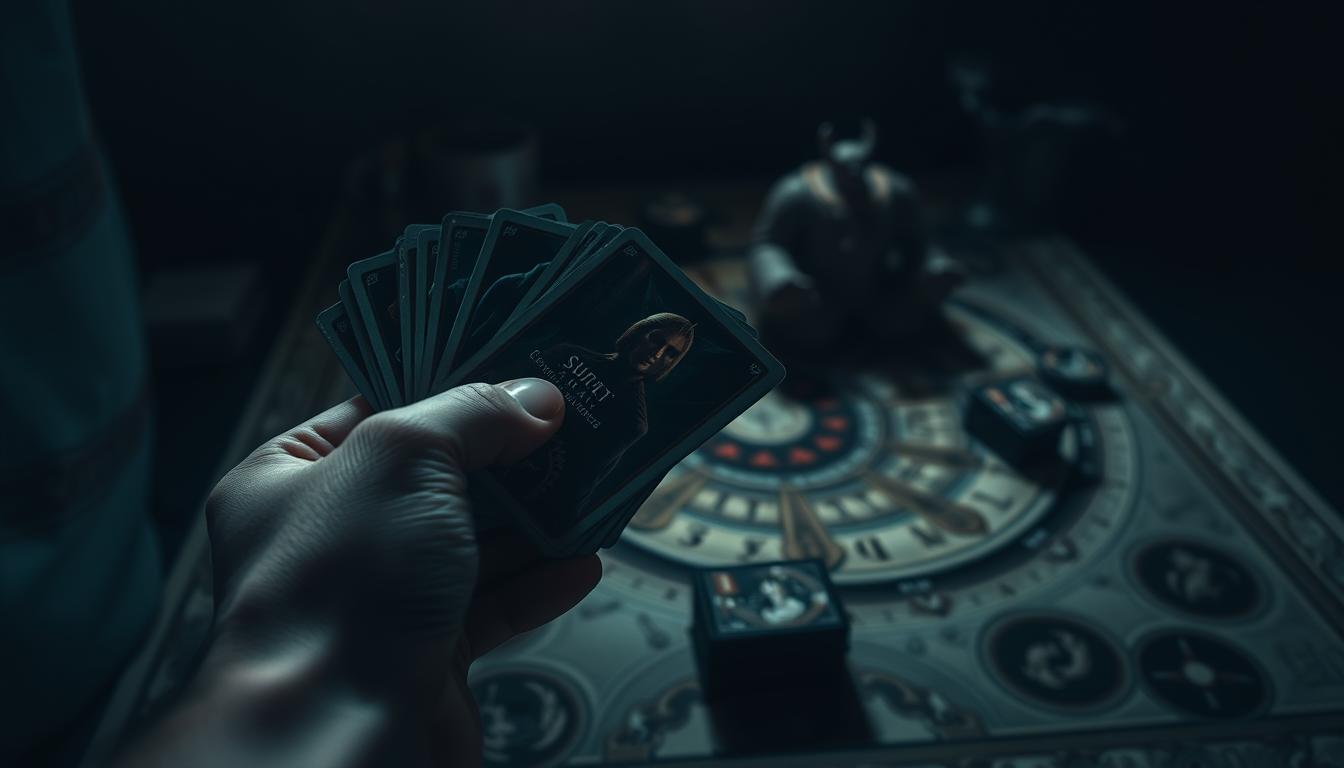Card games are more than luck. They are a fun way to improve your mind. Whether you play for fun or seriously, these games are great for your brain.
Strategy card games make you think deeply. They need critical thinking and pattern recognition. These games turn fun into a brain workout.
Our guide will show you the best strategy card games. They make playing games a fun learning experience. These games are great for all ages.
Get ready for a journey of strategy card games. They will challenge your mind and keep you thinking. Each game is a unique way to keep your brain sharp.
Understanding Strategy Card Games and Their Mental Benefits
Strategy card games are more than fun. They help your brain grow and improve thinking skills. People of all ages can get better mentally by playing these games.
Card games are great for your brain. They work many parts of your brain at once. This is a better way to learn than usual methods.
Cognitive Development Through Card Gaming
Playing strategic card games makes your brain work better. You learn to:
- Analyze complex scenarios quickly
- Develop logical reasoning skills
- Practice advanced problem-solving techniques
- Enhance computational thinking
Memory Enhancement and Pattern Recognition
Playing cards often helps your memory. You get better at seeing patterns and remembering things. These skills help you do better in everyday life.
Decision-Making Skills Improvement
Card games teach you to make smart choices quickly. You learn to think about risks and outcomes. This makes your decision-making skills better, and it’s fun to learn.
The Evolution of Card Games That Require Strategy
The history of strategy card games is really interesting. It shows how games have changed from simple to complex over time. At first, cards were used for gambling and social fun.
As people played, they wanted more than luck. Games like Bridge and Whist became more complex. Players learned to make smart choices and think ahead.
- Traditional playing cards originated in China during the Tang dynasty
- European card games expanded strategic thinking in the 14th century
- Modern deck-building games introduced innovative strategic elements
The 20th century was a big change for card games. Games like Magic: The Gathering brought new rules and deck-building. Digital games also made it easier for people to play together from anywhere.
Today, strategy card games are all about thinking and strategy. They mix psychology, math, and creativity. These games are not just fun; they also make your brain work hard.
Classic Strategy Card Games Everyone Should Know
Classic card games are loved by many for their mental challenge and social fun. They are more than just games. They help improve thinking, planning, and how we interact with others.

Strategy card games mix skill, psychology, and brain power. Players face mental battles. They must read others, figure out chances, and make fast choices.
Bridge: The Ultimate Social Strategy Game
Bridge is a top card game for teams. It needs clear talking and smart plans with your partner. The game asks for:
- Precise communication
- Advanced pattern recognition
- Complex decision-making skills
Poker: Blending Psychology with Mathematical Odds
Poker is where psychology meets math. Players need to:
- Read opponent’s body language
- Calculate probability
- Manage risk effectively
Spades: Team-Based Strategic Thinking
Spades is all about teamwork and strategy. It’s a game where partners must work together. They need to guess what will happen and plan their moves.
Bridge, Poker, and Spades are more than games. They give players a mental challenge. They also help build social skills and create lasting memories.
Modern Deck-Building Games Taking the World by Storm
Deck-building games have changed the world of card games. They offer a unique and exciting experience. Players build their own deck of cards as they play, making each game different and fun.
So, why do people love deck-building games? They mix several fun elements that attract both new and experienced players:
- Dynamic strategy that evolves throughout the game
- Personal deck customization
- Replay value with multiple winning approaches
- Quick learning curve for new players
Games like Dominion, Star Realms, and Ascension are favorites among players. They offer endless ways to create unique strategies and try out different play styles.
Players start with basic cards and get more powerful ones as they play. This makes the game exciting, as every choice affects the next turn. The main challenge is balancing getting new cards, managing resources, and planning your strategy.
Whether you love strategy games or are new to deck-building, there’s something for you. These games mix skill, luck, and creativity into a fun experience that draws players from all over.
Competitive Trading Card Games for Strategic Minds
Trading card games have changed the world of strategic gaming. They offer players deep experiences that test their minds and creativity. These games are more than just card play. They create worlds where strategy, collection, and competition meet.
There are many exciting games for those who love strategic card games. Let’s look at three popular ones that have won the hearts of players everywhere:
Magic: The Gathering – Deep Strategic Gameplay
Magic: The Gathering is a key game in strategic trading card games. Players craft detailed decks, summon creatures, and cast spells in a battle of wits. Each game needs careful planning, managing resources, and guessing what the opponent will do.
- Complex deck-building strategies
- Diverse card interactions
- Competitive tournament scenes
Pokemon TCG – Strategic Collection and Combat
Pokemon TCG mixes collecting with strategic gameplay. Players build teams of Pokemon, each with unique abilities. The game asks for choosing cards wisely, knowing type advantages, and guessing opponents’ plans.
- Collectible character-based gameplay
- Balanced battle mechanics
- Regular card set expansions
Yu-Gi-Oh! – Complex Chain Strategies
Yu-Gi-Oh! adds a new level of strategy with its complex chain mechanics. Players make detailed combos, use trap cards, and stop opponents’ moves. The game needs fast thinking and a deep understanding of card interactions.
- Advanced chain link mechanics
- Rapid-response gameplay
- Highly competitive tournament structure
Each game offers a unique strategic challenge. They push players to think deeply, adapt quickly, and plan complex strategies.
Solo Strategy Card Games for Mental Exercise

Solo card games are a great way to challenge your mind. They improve your problem-solving skills and keep your brain sharp. Solitaire strategy games are more than just fun – they’re a mental workout.
Traditional solitaire has grown a lot since the old computer game days. Now, there are many solo card games that are complex and challenging. They test your strategic thinking and decision-making.
- Spider Solitaire: A game that needs careful planning and sequence management
- FreeCell: Offers nearly 100% winnable scenarios with complex strategic choices
- Pyramid Solitaire: Challenges players to remove cards through mathematical combinations
These solitaire strategy games are not just for fun. They help players relax and improve their thinking. The best part is, you can play them anywhere, anytime.
Playing solo card games requires a strategic approach. You learn to think ahead, spot patterns, and solve problems. Regular play boosts your memory, focus, and problem-solving skills in a fun way.
- Develop patience and strategic planning
- Enhance pattern recognition skills
- Improve decision-making under pressure
If you want to keep your mind sharp or just enjoy a solo game, solitaire strategy games are perfect. They mix fun with mental exercise, available anytime.
Family-Friendly Strategy Card Games for All Ages
Family card games are great for bonding, learning, and having fun. They’re not just for fun—they help improve thinking skills and make memories. These games make family game nights exciting and educational for everyone.
When picking family card games, choose ones that are fun and challenging. The best games are both fun and strategic.
Uno: Beyond the Basics
Uno is more than a simple game. Players can learn advanced strategies to make it competitive. Some advanced moves include:
- Carefully tracking card colors and numbers
- Strategically saving special action cards
- Blocking opponents’ potential moves
- Understanding probability and card distribution
Rook: Strategic Family Fun
The Rook game is a great choice for families who want a more complex game. It’s a trick-taking game that’s fun for kids and teaches strategic thinking. Rook helps players learn:
- Predicting opponent behaviors
- Managing limited resources
- Making calculated risks
- Developing long-term game plans
Playing these games regularly can make learning fun. It helps improve thinking skills and brings families closer together.
Advanced Tactics for Strategy Card Game Masters
Mastering strategy card games is more than knowing the rules. True game masters use expert-level tactics. They know that winning involves more than just picking the right cards. It’s about using complex strategies to outsmart opponents.
Professional players turn simple games into strategic battles. They use advanced strategies that require deep thinking and quick decision-making. This is what sets them apart from casual players.
- Probability calculation for potential outcomes
- Psychological manipulation through strategic bluffing
- Long-term strategic planning
- Reading opponent’s potential moves
Expert-level tactics need a lot of practice and focus. Players must think ahead, understand the game well, and spot patterns quickly. The best players keep improving, making their game unpredictable and exciting.
Key skills for advanced players include:
- Analyzing statistical probabilities
- Developing multi-turn strategic plans
- Managing psychological pressure
- Maintaining emotional composure
Players who want to be masters spend a lot of time learning. They study game theory, watch professional tournaments, and practice making decisions. Becoming a master takes patience, sharp thinking, and a love for learning.
Online Platforms for Strategy Card Gaming
The digital world has changed how we play strategy card games. Online platforms connect players worldwide. They bring classic card games to our phones and computers.

Digital versions of card games add new features. They make games more fun and easy to play. Now, you can play your favorite games anytime, anywhere.
Digital Versions of Classic Card Games
Online platforms have made classic card games better. They offer cool features:
- Instant matchmaking with players worldwide
- Real-time game tracking and statistics
- Tutorials for new players
- Competitive ranking systems
Mobile Strategy Card Game Innovations
Mobile games have changed strategy gaming. They offer fun, interactive experiences. These platforms have:
- Cross-platform play between mobile and desktop
- Regular game updates and new content
- Sophisticated AI opponents
- Social networking features
Online card games are fun for everyone. They challenge your mind and connect you with others.
Tournament-Level Strategy Card Games
Competitive card gaming has grown from just playing for fun to a big global event. Now, thousands of players gather for tournaments. They want to show off their strategic skills and compete at the top.
These events test players’ knowledge, quick thinking, and mental sharpness.
Professional card game tournaments cover many areas, each needing its own skills:
- Magic: The Gathering World Championship
- Poker World Series
- Bridge International Championships
- Hearthstone Global Games
To do well, players spend a lot of time preparing. They study game rules, think about their opponents’ moves, and come up with smart plans. The best players treat it like a sport, using their brains and training hard.
Winning tournaments can lead to big prizes. Players can earn a lot of money, get sponsorships, and become famous. There are also smaller events that help new players get noticed.
New digital places have made it easier for players to join tournaments. Now, people from all over can play in big events. Online qualifiers and streaming sites have opened doors for talented players to show off their skills.
Building Your Strategy Card Game Collection
Starting a card game collection is fun for strategy game fans. It doesn’t matter if you’re new or want to grow your collection. Choosing the right games can make your gaming better. A good collection gives you hours of fun and brain challenges.
Building your collection needs careful thought. Beginners should pick games that teach basic strategies and are fun.
Essential Games for Beginners
Start with games that are easy to learn but still fun:
- Uno: A classic game teaching basic strategy and quick thinking
- Rook: Introduces trick-taking and partnership dynamics
- Sushi Go: Teaches resource management and card drafting
- Love Letter: Develops deduction and bluffing skills
Advanced Additions for Experienced Players
As you get better, add games that are more challenging:
- Magic: The Gathering – Deep strategic deck-building game
- Netrunner – Asymmetrical strategy with intricate gameplay
- Dominion – Sophisticated deck-building mechanics
- Race for the Galaxy – Complex resource management
Having a wide range of games lets you try different strategies. Mix simple and hard games to keep things interesting. The best collection shows what you like and tests your thinking.
Mastering Psychology in Strategy Card Games
Card game psychology is more than just knowing the rules. Top players know that mental strategies are key to winning. They read opponents’ signals, manage their emotions, and stay focused.
Player psychology is about observing and understanding emotions. Experienced gamers control their feelings and watch their opponents’ body language and betting. Players like Daniel Negreanu show how knowing human behavior can help win.
Mental strategies need practice and self-awareness. Players must learn to handle tilt, the frustration that can affect judgment. By being emotionally strong and strategic, gamers make better decisions, improving their game and life.
Building strong psychological skills takes effort and time. Players should study successful ones, practice mindfulness, and stay disciplined. The best players mix technical skills with deep psychological insights.

